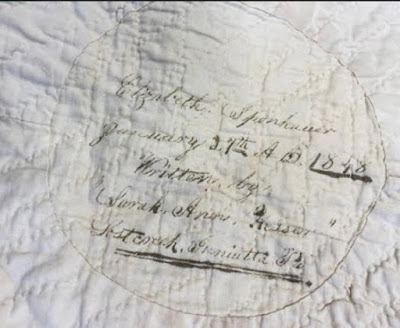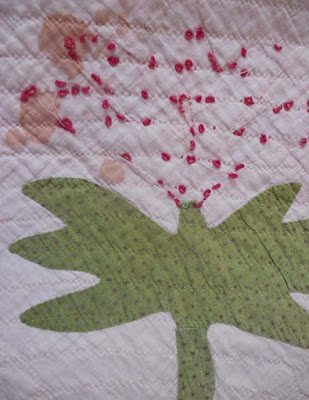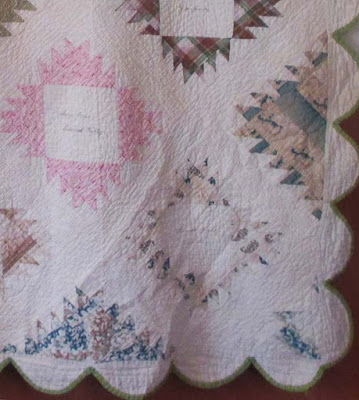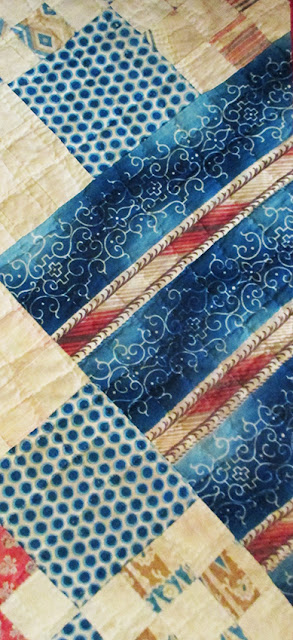My office
On the wall a recent gift from friend Wendy Turnbull, moving it from
her home for orphan quilts to mine. One fourth of a large quilt.
I am thrilled. It is not in good condition but what remains is a terrific
document. Many blocks have a name and place and some a date of 1848.
"Stephen H. Lapp
Lostcreek."
The names are not actually signatures but rather written by one person,
a scrivener or scribe with exemplary handwriting.
I doubt Stephen stitched the block either.
"Elizabeth Sponhauer
January 27th A.D. 1848
Written by
Sarah Anne Hieser
Lostcreek, Juniatta [sic] Pa"
Sarah was apparently the scribe and Elizabeth the recipient. She
married in 1848 and January 27th was probably the date.
All that's left.
Inside that floral is an applique block that has completely faded to white. I can see that it may have looked like these very typical Pennsylvania fleur-de-lis.
The center block is 32" square
I traced the photo
What would make a fabric---a solid it seems to have been---fade completely to white? I have seen this in the 1840-1865 era with solid blues dyed with Prussian blue. Prussian blue is colorfast EXCEPT when you wash it in an alkalai solution, which is what laundry soap is. You can wash it enough times that it completely fades away and I bet that is what's happened here. A little chlorine bleach probably increased the fading. Notice how white the whole thing is---it's been bleached.
Blocks are cut in half and quarters to finish out the repeat.
The quilt was once red, green and Prussian blue with some pinks and browns. Several Prussian blue and buff style prints are in the blocks placed around the edges. The Prussian blue prints hold up better than the solids.
It's scalloped all around and bound with a plain green.
Scallsops rather unusual for the time but there are other examples.
The rainbow blue prints were so fashionable in the 1840s. I recognized one.
A rainbow blue stripe alternating with a red, pink and brown shaded stripe.
I had another quilt with the same fabric in it (slightly different colorway.) Prussian blue expert Anita Loscalzo has that quilt now. I actually did a Moda reproduction print of this stripe in the Baltimore Blues line a few years ago but we could not get it to work in blue (rainbow prints were hard to obtain in 1840 and apparently harder today.)
Becky Brown's been fussy-cutting the brown versions
of that stripe for our Hands All Around BOM.
Wish it could have been blue too.
Look how long this post is and we haven't even gotten to the names and the people yet. More tomorrow: https://barbarabrackman.blogspot.com/2021/05/1848-quilt-part-2.html
And see more about the groom here:
















No comments:
Post a Comment